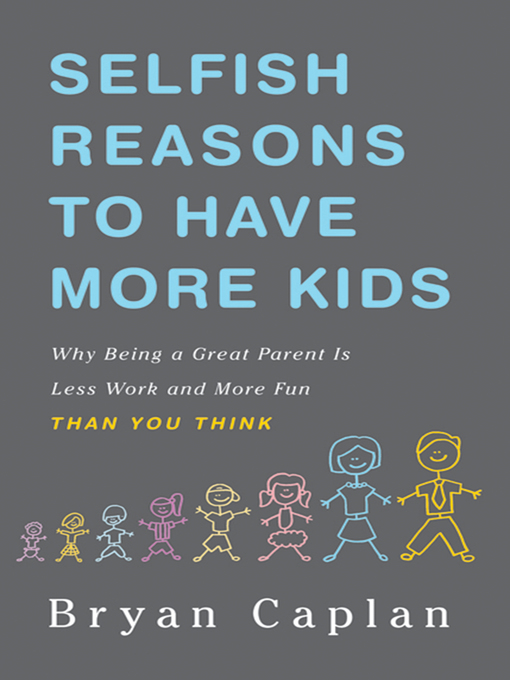- All Fiction
- Military Fiction
- Historical Fiction
- Mystery & Thriller
- Romance
- See all fiction collections
Selfish Reasons to Have More Kids
Why Being a Great Parent is Less Work and More Fun Than You Think
Selfish Reasons to Have More Kids is a book of practical big ideas. How can parents be happier? What can they change — and what do they need to just accept? Which of their worries can parents safely forget? Above all, what is the right number of kids for you to have? You'll never see kids or parenthood the same way again.
-
Creators
-
Publisher
-
Release date
April 12, 2011 -
Formats
-
Kindle Book
-
OverDrive Read
- ISBN: 9780465023417
-
EPUB ebook
- ISBN: 9780465023417
- File size: 431 KB
-
-
Languages
- English
-
Reviews
-
Kirkus
March 1, 2011
An unconvincing appeal to increase our collective birth-rate.
While the author's mission is noble--encouraging individuals to parent two or more children--much of the book's content is dubious and contradictory. The Cato Institute's Caplan (Economics/George Mason Univ.) begins by speculating that it's selfish not to have children: "To deny the gift of life to a child who would have made your life better is a tragic missed opportunity." The author, himself a father of three, seems unduly worried that would-be parents are talking themselves out of having children or expanding their families because they are either uninformed or focusing too much on the negative aspects of parenting. Yet, he neglects to mention postpartum depression, which affects up to 20 percent of new mothers and is often regarded as a convincing argument against pregnancy. Caplan plies readers with a variety of statistics, some of which are of questionable values--e.g., he cites a study that finds individuals with children are "5.6 percentage points less likely to be very happy" than those without children. His argument loses further muster when he states: "Last week, we left our seven-year-olds home alone for the first time; before long, they'll be babysitting their little brother." The author's most implausible suggestion, however, might be his belief that parents should offer their adult children financial support to produce grandchildren in the form of early retirement gifts.
Inconsistent and unpersuasive.
(COPYRIGHT (2011) KIRKUS REVIEWS/NIELSEN BUSINESS MEDIA, INC. ALL RIGHTS RESERVED.)
-
Formats
- Kindle Book
- OverDrive Read
- EPUB ebook
subjects
Languages
- English
Loading
Why is availability limited?
×Availability can change throughout the month based on the library's budget. You can still place a hold on the title, and your hold will be automatically filled as soon as the title is available again.
The Kindle Book format for this title is not supported on:
×Read-along ebook
×The OverDrive Read format of this ebook has professional narration that plays while you read in your browser. Learn more here.

